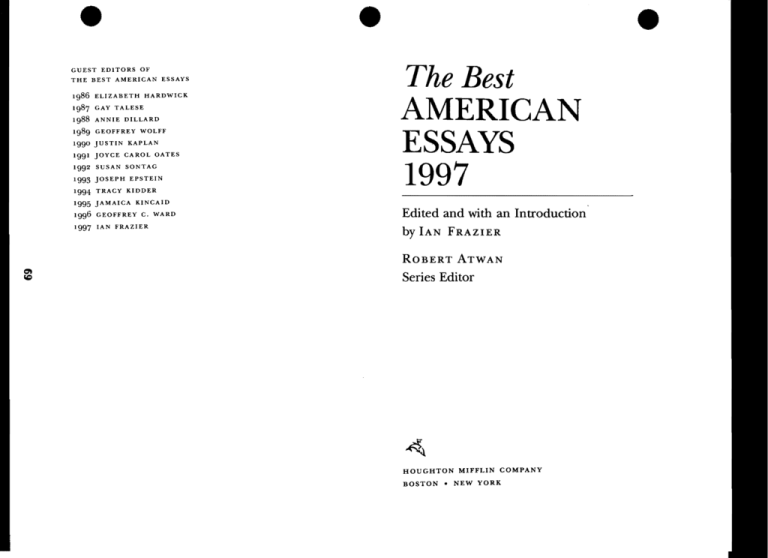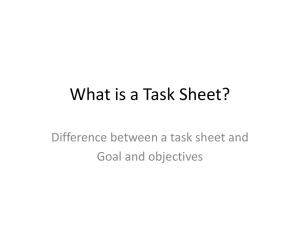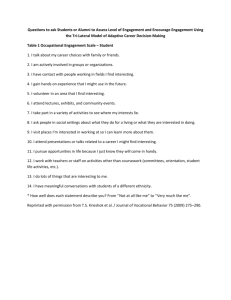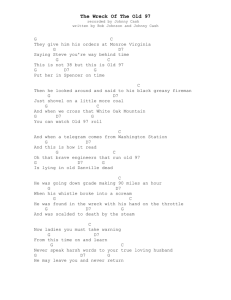
•
GUEST EDITORS OF
THE BEST AMERICAN ESSAYS
1986
1987
1988
1989
1990
1991
1992
1993
1994
1995
1996
1997
ELIZABETH HARDWICK
GAY TALESE
ANNIE DILLARD
GEOFFREY WOLFF
JUSTIN KAPLAN
JOYCE CAROL OATES
SUSAN SONTAG
JOSEPH EPSTEIN
TRACY KIDDER
•
•
The Best
AMERICAN
ESSAYS
1997
JAMAICA KINCAID
GEOFFREY C. WARD
IAN FRAZIER
Edited and with an Introduction
by IAN
FRAZIER
ROBERT ATWAN
""
Series Editor
HOUGHTON MIFFLIN COMPANY
BOSTON •
NEW YORK
Copyright © 1997 by Houghton Millin Company
Introduction copyright © 1997 by Ian Fr-dZier
ALL RIGHTS RESERVED
No part of this book may be reproduced or transmitted in any form or by any
means, electronic or mechanical, including photocopying and recording, or by any
information storage or retrieval system without the prior written permission of the
copyright owner unless such copying is expressly permitted by federal copyright
law. With the exception of nonprofit transcription in Braille, Houghton Millin is
not authorized to grant permission for further uses of copyrighted selections
reprinted in this book without the permission of their owners. Permission must be
obtained from the individual copyright owners as identified herein. Address requests for permission to make copies of Houghton Millin material to Permissions,
Houghton Millin Company, 215 Park Avenue South, New York, New York 10003.
ISSN
0888-3742
ISBN ISBN <r395-85695-7 (PBK.)
Printed in the United States of America
10987 6 5 43
QUM
"Notes on My Mother" by Hilton Als. First published in The New Yorke>: Copyright
© 1996 by Hilton Als. Reprinted by permission of Farrar, Straus & Giroux, Inc.,
"'-I
Q
from The Women.
"The Fourth State of Matter" by Jo Ann Beard. First published in The New Yorker.
Copyright © 1996 by Jo Ann Beard. Reprinted by permission of Sterling Lord
Literistic, Inc.
"First Tell Me What Kind of Reader You Are" by Roy Blount, Jr. First published
in The Oxford American. Copyright © 1996 by Roy Blount, Jr. Reprinted by permission of the author.
"Labyrinthine" by Bernard Cooper. First published in The Paris Review. Copyright
© 1996 by Bernard Cooper. Reprinted by permission of International Creative
Management, Inc.
"Legends of the FaU" by Louis de Bernieres. First published in Harper's Magazine.
Copyright © 1996 by Louis de Bernieres. Reprinted by permission of the author.
"Who Shot Johnny?" by Debra Dickerson. First published in The New &public.
Copyright © 1996 by Debra Dickerson. Reprinted by permission of the author.
"In the Face" by Richard Ford. First published in The New Yorker. Subsequently
published in The Fights, photographed by Charles Hoff (Chronicle Books, 1996).
Copyright © 1996 by Richard Ford. Reprinted by permission of International
Creative Management, Inc.
"Rat Patrol: A Saga" by Frank Gannon. First publiShed in Harper's Magazine.
Copyright © 1996 by Frank Gannon. Reprinted by permission of Frank Gannon.
"Northeast Direct" by Dagoberto Gilb. First published in The Threepenny Review.
Copyright © 1996 by Dagoberto Gilb. Reprinted by permission of the author.
"We Are StiU Only Human" by Verlyn K1inkenborg. First published in The New
York Times Magazine. Copyright © 1996 by Verlyn K1inkenborg. Reprinted by permission of The New York Times Company.
"Ring Leader" by Natalie Kusz. First published in Allure. Copyright © 1996 by
Natalie Kusz. Reprinted by permission of Brandt & Brandt Literary Agents, Inc.
"Don't Get Comfortable" by Naton Leslie. First published in High Plains Literary
Review. Copyright © 1996 by Naton Leslie. Reprinted by permiSSion of the author.
"Twenty-Fish Days" by Thomas McGuane. First published in Sports Afield. Copyright © 1996 by Thomas McGuane. Reprinted by permission of the author.
"Backlogs of History" by Cullen Murphy. First published in The Atlantic Monthly.
Copyright © 1996 by Cullen Murphy. Reprinted by permission of the author.
"A Drugstore Eden" by Cynthia Ozick. First published in The New Yorker. Copyright
© 1996 by Cynthia Ozick. Reprinted by permission of the author and Raines &
Raines.
"My Father" by Lukie Chapman Reilly. First published in Under the Sun. Copyright
© 1996 by Lukie Chapman Reilly. Reprinted by permission of the author.
"Living in Tongues" by Luc Sante. First published in The New York Times Magazine.
Copyright © 1996 by Luc Sante. Reprinted by permission of the author.
"My Habit" by Paul Sheehan. First published in The New Yorker. Copyright © 1996
by Paul Sheehan. Reprinted by permission of the author.
"Dinner at Uncle Boris's" by Charles Simie. First published in Creative Nonfiction.
Copyright © 1996 by the Creative Nonfiction Foundation. Reprinted by permission
of the Creative Nonfiction Foundation.
Swans" by Lauren Slater. First published in The Missouri Review. Copyright
© 1996 by Lauren Slater. Reprinted by permission of the author.
"A Century of Cinema" by Susan Sontag. First published in The New York Times
Magazine. Copyright © 1996 by Susan Sontag. Reprinted by permission of the Wylie
Agency.
"Ali in Havana" by Gay Talese. First published in Esquire. Copyright © 1996 by
Gay Talese. Reprinted by permission of Esquire.
"The Gangster We Are All Looking For" by Le Thi Diem ThUy. First published
in The Massachusetts Review. Copyright © 1996 by Le Thi Diem Thuy. Reprinted by
permission of the author and the Walkins Loomis Agency, Inc.
"The Case Against Babies" by Joy Williams. First published in Cranta. Copyright
© 1996 by Joy Williams. Reprinted by permission of International Creative Management, Inc.
•
•
DEBRA DICKERSON
Who Shot Johnny?
FROM THE NEW REPUBLIC
GIVEN MY LEVEL of political awareness, it was inevitable that I
would come to view the everyday events of my life through the
prism of politics and the national discourse. I read The Washington
Post, The New &public, The New Yorker, Harper's, The Atlantic Monthly,
The Nation, National Review, Black Enterprise, and Essence and wrote
a weekly column for the Harvard Law School Record during my
three years just ended there. I do this because I know that those
of us who are not well-fed white guys in suits must not yield the
debate to them, however well-intentioned or well-informed they
may be. Accordingly, I am unrepentant and vocal about having
gained admittance to Harvard through affirmative action; I am a
feminist, stoic about my marriage chances as a welI-educated,
thirty-six-year-old black woman who won't pretend to need help
taking care of herself. My strength flags, though, in the face of the
latest role assigned to my family in the national drama. On July
27, 1995, my sixteen-year-old nephew was shot and paralyzed.
Talking with friends in front of his house, Johnny saw a car he
thought he recognized. He waved boisterously - his trademark
throwing both arms in the air in a full-bodied, hip-hop Y. When
he got no response, he and his friends sauntered down the walk
to join a group loitering in front of an apartment building. The
car followed. The driver got out, brandished a revolver, and fired
into the air. Everyone scattered. Then he took aim and shot my
running nephew in the back.
Johnny never lost consciousness. He lay in the road, trying to
understand what had happened to him, why he couldn't get up.
•
DEBRA DICKERSON
47
•
Emotionlessly, he told the story again and again on demand, remaining apologetically firm against all demands to divulge the
missing details that would make sense of the shooting but obviously
cast him in a bad light. Being black, male, and shot, he must apparently be involved with gangs or drugs. Probably both. Witnesses
corroborate his version of events.
Nearly six months have passed since that phone call in the night
and my nightmarish headlong drive from Boston to Charlotte.
Mter twenty hours behind the wheel, I arrived haggard enough to
reduce my mother to fresh tears and to find my nephew reassuring
well-wishers with an eerie sang-froid.
I take the day shift in his hospital room; his mother and grandmother, a clerk and cafeteria worker, respectively, alternate nights
there on a cot. They don their uniforms the next day, gaunt after
hours spent listening to Johnny moan in his sleep. How often must
his subconscious replay those events and curse its host for saying
hello without permission, for being carefree and young while a
would-be murderer hefted the weight of his uselessness and failure
like Jacob Marley's chains? How often must he watch himself lying
stubbornly immobile on the pavement of his nightmares while the
sound of running feet syncopate his attacker's taunts?
I spend these days beating him at gin rummy and Scrabble,
holding a basin while he coughs up phlegm and crying in the corridor while he catheterizes himself. There are children here much
worse off than he. I should be grateful. The doctors can't, or won't,
say whether he'll walk again.
I am at once repulsed and fascinated by the bullet, which remains lodged in his spine (having done all the damage it can do,
the doctors say). The wound is undramatic - small, neat, and
perfectly centered - an impossibly pink pit surrounded by an
otherwise undisturbed expanse of mahogany. Johnny has asked me
several times to describe it but politely declines to look in the
mirror I hold for him.
Here on the pediatric rehab ward, Johnny speaks little, never
cries, never complains, works diligently to become independent.
He does whatever he is told; if two hours remain until the next
pain pill, he waits quietly. Eyes bloodshot, hands gripping the bed
rails. During the week of his intravenous feeding, when he was
tormented by the primal need to masticate, he never asked for
48
Who Shot Johnny?
food. He just listened while we counted down the days for him
and planned his favorite meals. Now required to dress himself
unassisted, he does so without demur, rolling himself back and
forth valiantly on the bed and shivering afterward, exhausted. He
"ma'am"s and "sir"s everyone politely. Before his "accident," a simple request to take out the trash could provoke a firestorm of teenage attitude. We, the women who have raised him, have changed
as well; we've finally come to appreciate those boxer-baring, oversized pants we used to hate - it would be much more difficult to
fit properly sized pants over his diaper.
He spends a lot of time tethered to rap music still loud enough
to break my concentration as I read my many magazines. I hear
him try to soundlessly mouth the obligatory "mothafuckers" overlaying the funereal dirge of the music tracks. I do not normally
tolerate disrespectful music in my or my mother's presence, but if
it distracts him now ...
'Johnny," I ask later, "do you still like gangster rap?" During the
long pause I hear him think loudly, I'm paralyzed, Auntie, not
stupid. "I mostly just listen to hip-hop," he says evasively into his
Sports Illustrated.
Miserable though it is, time passes quickly here. We always seem
to be jerking awake in our chairs just in time for the next pill, his
every-other-night bowel program, the doctor's rounds. Harvard
feels a galaxy away - the world revolves around Family Members
Living with Spinal Cord Injury class, Johnny's urine output, and
strategizing with my sister to find affordable, accessible housing.
There is always another long-distance uncle in need of an update,
another church member wanting to pray with us, orJohnny's little
brother in need of some attention.
We Dickerson women are so constant a presence the ward nurses
and cleaning staff call us by name and join us for cafeteria meals
and cigarette breaks. At Johnny's birthday pizza party, they crack
jokes and make fun of each other's husbands (there are no men
here). I pass slices around and try not to think, Seventeen with a
bullet.
Oddly, we feel little curiosity or specific anger toward the man
who shot him. We have to remind ourselves to check in with the
police. Even so, it feels pro forma, like sending in those $2 rebate
DEBRA DICKERSON
49
forms that come with new pantyhose: you know your request will
fall into a deep, dark hole somewhere, but still, it's your duty to
try. We push for an arrest because we owe it to Johnny and to
ourselves as citizens. We don't think about it otherwise - our low
expectations are too ingrained. A Harvard aunt notwithstanding,
for people like Johnny, Marvin Gaye was right that only three
things are sure: taxes, death, and trouble. At least it wasn't the
second.
We rarely wonder about or discuss the brother who shot him
because we already know everything about him. When the call
came, my first thought was the same one I'd had when I'd heard
about Rosa Parks's beating: a brother did it. A nonjob-having,
middle-of-the-day malt-liquor-drinking, crotch-clutching, loud-talking brother with many neglected children born of many forgotten
women. He lives in his mother's basement with furniture rented
at an astronomical interest rate, the exact amount ofwhich he does
not know. He has a car phone, an $80 monthly cable bill, and
every possible phone feature but no savings. He steals Social Security numbers from unsuspecting relatives and assumes their
identities to acquire large 1V sets for which he will never pay. On
the slim chance that he is brought to justice, he will have a colorful criminal history and no coherent explanation to offer for his
act. His family will raucously defend him and cry cover-up. Some
liberal lawyer just like me will help him plea-bargain his way to yet
another short stay in a prison pesthouse that will serve only to add
another layer to the brother's sociopathology and formless, mindless nihilism. We know him. We've known and feared him all our
lives.
As a teenager, he called, "Hey, baby, gimme somma that boodie!"
at us from car windows. Indignant at our lack of response, he
followed up with, "Fuck you, then, 'ho!" He called me a "whiteboy-lovin' nigger bitch oreo" for being in the gifted program and
loving it. At twenty-seven, he got my seventeen-year-old sister pregnant with Johnny and lost interest without ever informing her that
he was married. He snatched my widowed mother's purse as she
waited in predawn darkness for the bus to work and then broke
into our house while she soldered on an assembly line. He chased
all the small entrepreneurs from our neighborhood with his violent thievery and put bars on our windows. He kept us from sitting
50
•
Who Shot Johnny?
on our own front porch after dark and laid the foundation for our
periodic bouts of self-hating anger and racial embarrassment. He
made our neighborhood a ghetto. He is the poster fool behind
the maddening community knowledge that there are still some
black mothers who raise their daughters but merely love their sons.
He and his cancerous carbon copies eclipse the vast majority of us
who are not sociopaths and render us invisible. He is the Siamese
twin who has died but cannot be separated from his living, vibrant
sibling; which of us must attract more notice? We despise and
disown this anomalous loser, but for many he is black America. We
know him, we know that he is outside the fold, and we know that
he will only get worse. What we didn't know is that, because of
him, my little sister would one day be the latest hysterical black
mother wailing over a fallen child on IV.
Alone, lying in the road bleeding and paralyzed but hideously
conscious, Johnny had lain helpless as he watched his wouldbe murderer come to stand over him and offer this prophecy:
"Betch'ou won't be doin' nomo' wavin', mothafucker."
Fuck you, asshole. He's fine from the waist up. You just can't do
anything right, can you?
•
•





